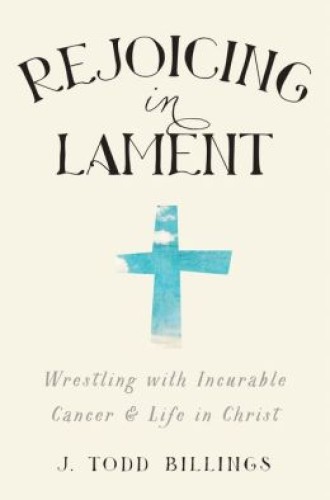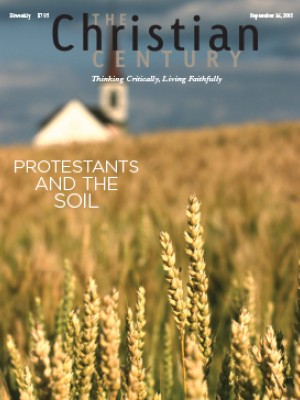Cancer and good news
When I returned to teaching theology to undergraduates after being diagnosed with stage IV breast cancer, I intended to say something about my condition on the first day of class. But I was still weak from radiation and from back surgery to repair two broken vertebrae, and on that first day I was focused on not falling over in front of the classroom. Words about cancer’s invasion of my body remained at bay.
By midsemester there still had been no mention of cancer. Then the first day of talking about theodicy arrived. Students generated a list of ways people try to fit together the puzzle of God’s relationship to human suffering, then the room grew quietly attentive. These young people wanted to delve more deeply into how Christians attempt to answer questions about why awful things happen to beautiful people, and where God might be in the midst of it all.
Read our latest issue or browse back issues.
Into this space I carried my story of being diagnosed with advanced-stage cancer at 42, of almost dying, of the lousy prognosis—and together we made various theological attempts to find answers bearing on that experience. It was a tough class, but a transformative one. I’ve long followed Parker Palmer’s guidance about self-disclosure in teaching: use it to serve the wider truth. But it took time and courage to offer up this aspect of my life as a case study for God’s relationship to suffering.
I’m in my sixth year of living with cancer, and I continue to bring my cancer story with me to class when we talk of theodicy. If I want students to understand how theology matters, they need to see real-life examples of how it does. That’s why I’m also turning less to traditional theological textbooks and more to the burgeoning genre of theo-memoir. For my students, who are increasingly unfamiliar with even the most basic theological vocabulary, serious theology that is woven through engaging personal stories—as in Nadia Bolz-Weber’s Pastrix—draws them in and creates new lenses for interpreting the world.
One of the most compelling recent additions to the genre of theo-memoir is J. Todd Billings’s Rejoicing in Lament: Wrestling with Incurable Cancer and Life in Christ. In it this gifted Reformed theologian and married father of two young children graciously, gracefully weaves his struggles with being diagnosed with a rare form of blood cancer at 39 together with probing biblical and theological reflection. He chronicles the terrible interruption that cancer brings into his life, as well as the deep pain—physical, emotional, and spiritual—that comes with treatment, prognosis, and radical alterations to his life. But Billings is clear from the very first page that the point of writing about life with cancer is not simply to share his own struggles. Rather, he intertwines his experiences of living with incurable cancer “with the exploration of a much weightier story—the story of God’s saving action in and through Jesus Christ.”
So that he can tell the much weightier story of God’s saving love, Billings rarely lingers over the difficult details of his own grave situation. He chronicles his illness just enough to give us a sense of how awful it is, and then we witness his impressive theological commitment to situate his story within the much larger divine story.
Key to this larger story for Billings is how all aspects of human life are experienced inside the greater drama of God’s love for creation. It doesn’t take long for readers to perceive not only that Billings is a skilled exegete, but also that his way of seeing the world is much like that of his theological ancestor John Calvin. Like Calvin, Billings uses scripture as a lens of faith to focus and sharpen his reading of life.
Though Billings’s personal and theological reflections are saturated with scriptural references from all parts of the Bible, he devotes special attention to the Psalms, which, he writes, “bring our whole life before God . . . and focus our eyes on God’s promises.” He makes a very important observation about how the Psalms tend to be used in Christian communities: they help us rejoice and they help us petition God when things get tough, but too rarely are we taught or encouraged to use Psalms for purposes of lament. Yet it is precisely the lament Psalms that open space for the “pain, confusion, and anger” we experience at life’s worst moments. Jesus cried out on the cross using a Psalm of lament. As Billings declares: “Both the psalmist and Jesus show us that it is not irreligious to cry out in pain and grief before God.” Lament is an act of faith, and the lament Psalms offer us words with which to cry out to God when we have no words of our own. Billings’s defense of lament is made all the more powerful by his description of how lament shapes his own prayer life.
Although Billings holds to a Reformed view of God’s providence (à la the Westminster Shorter Catechism), his life with cancer compels him to articulate a personal and poignant take on God’s preservation and governance of creation. In response to claims that his cancer is “part of God’s perfect plan,” Billings explains how providence differs from monocausality, in which God is seen as directly responsible for everything that happens in the world. Scripture clearly demonstrates that “God is not the sole actor in the world,” so Billings is frustrated with prayers that ask for complete healing for him. Even though he believes that God is capable of acting outside of ordinary processes, he is well aware of the incurable status of his cancer. Billings counsels those who pray for him to pray for prolonged remission, for God to work in, with, and through the treatment he’s receiving.
Living with lament as Billings does opens theological space where many of us who struggle to discern God’s whereabouts amid a cancer diagnosis or other awful experience will find room for our own doubts, grief, anger, and hope. Billings also captures well the immense challenge of talking about faith in the toughest of times. Some people say regarding his diagnosis, “God’s will is perfect,” and he admits that such statements “seem to minimize my actual pain.” He confesses that sometimes he gets tired of hoping. When friends say they admire his faith, he’s not sure what this means. He wonders, “Do I deserve credit for my faith?” Answering his own question in the negative, he turns our attention again to the larger story about a God who loves and cares for him, cancer and all, and for all of creation.
Billings is resolute in his insistence that the Bible does not offer a tidy response to the problem of evil, but his trust in God’s providence over all of life—the good and the evil, the beautiful and the tragic, good health and disease—never waivers. A big point for him is that throughout the Psalms lament is voiced in the context of God’s hesed—faithful loving-kindness. Although he rejects the suggestion that God actively causes cancer, Billings believes that God permits cancer, even as God’s permissive will is grounded in love. But why? Why cancer? Why should anyone be cut down in the prime of life? We don’t know. Billings wrestles in an anguished, elegant way with these questions, and in the end, he takes great comfort in the conviction that God remains sovereign over all.
Billings’s courageous theo-memoir teaches us not only about living realistically and hopefully in the face of an incurable disease, but also about a contemporary theology of providence wide and deep enough to hold serious grief, anguish, hope, and trust. He mounts critiques against approaches like open theism and Moltmann’s trinitarian theology of suffering so as to preserve divine impassibility, in which “suffering and dying are not internal to the life of God.”
When I bring my own experiences of living with cancer together with questions about God’s relationship to suffering, I tend to linger with the questions a bit longer than Billings does. While it’s important to emphasize that most Psalms of lament end with trust in God’s hesed, there’s still Psalm 88, where no resolution exists—where questions are left unanswered. Just as we need more space for lament, my students and I talk about the need for theodicies that move a bit more slowly toward resolution, that make more space for the “Why?”
Billings and I hold somewhat different theological commitments, but this does not detract from my deep gratitude for the gift of his theo-memoir. It required great courage to write, and it will leave any reader transformed.






